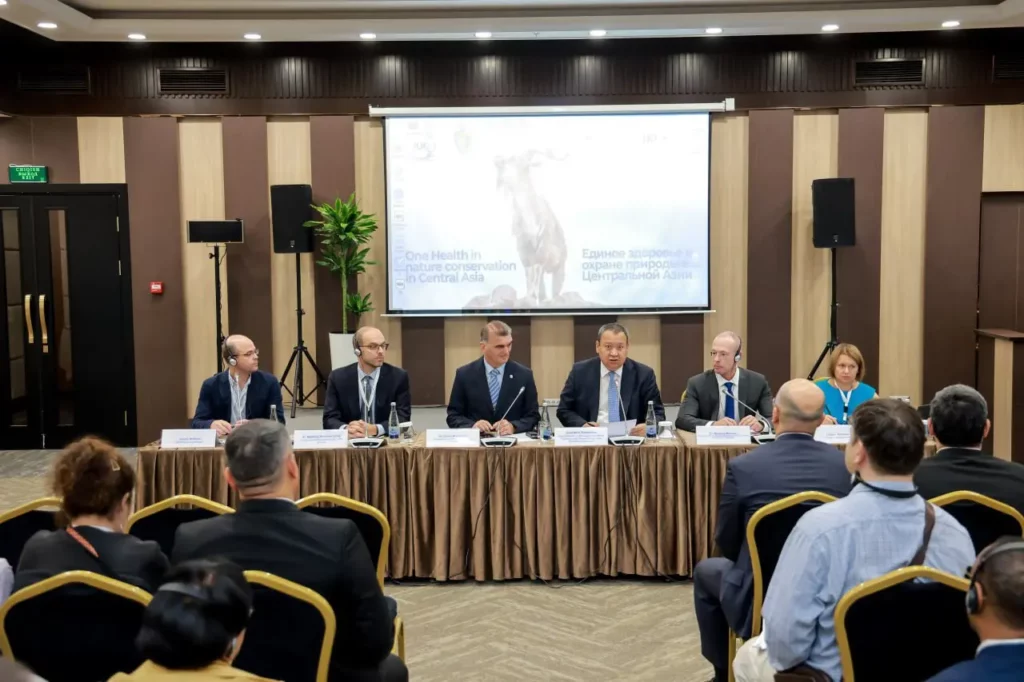A regional seminar on the implementation of the project “One Health in Nature Conservation in Central Asia”, organized by the International Union for Conservation of Nature (IUCN) in cooperation with the Ministry of Ecology, Environmental Protection, and Climate Change, has begun in Tashkent.

The event was attended by government representatives from Kazakhstan, the Kyrgyz Republic, Tajikistan, Turkmenistan, and Uzbekistan, and Embassy of the Federal Republic of Germany in Tashkent, the Federal Ministry for the Environment, Nature Conservation, Nuclear Safety and Consumer Protection (BMUV), the International Climate Initiative (IKI), the World Bank, the Food and Agriculture Organization of the United Nations (FAO), the Ilbirs Foundation and other international organizations.
“Nature conservation plays a crucial role in reducing zoonotic risks through enhancing the resilience of Central Asian landscapes – essential for safeguarding human, animal, and environmental health that lie at the heart of the One Health approach”, said Oliver Avramoski, Director of the IUCN Regional Office for Eastern Europe and Central Asia (ECARO). “We are committed to supporting governments in building national and regional capacity by applying IUCN’s tools and standards, including the IUCN Green List, which is a global benchmark for effective and equitable area-based conservation”.
The “One Health in Nature Conservation in Central Asia” project applies the “One Health” approach that integrates human, animal, and environmental health, strengthening collaboration across sectors and disciplines such as medicine, veterinary science, ecology, and public health.
“It is a well-known fact that “Nature knows no borders”, and biodiversity loss, ecosystem degradation, and climate change increase the risks of spreading outbreaks of zoonotic diseases. We hope that this project will serve as a good platform for coordinated efforts between Central Asian countries to prevent risks of zoonotic diseases, and raise awareness about the connection between nature conservation, ecosystem health, and human well-being”, said Deputy Minister of Ecology Jusipbek Kazbekov.
It is worth noting that the risk of zoonotic diseases in Central Asia is exacerbated by the loss of biodiversity and changes in the interaction between humans and wildlife. To reduce these risks, from 2023 to 2027, the IUCN is implementing a project worth 10.5 million euros in 5 Central Asian countries in cooperation with national authorities and international partners.
“With this newly launched IKI project, BMUV aims to contribute to prevent future zoonoses. This innovative project is set to operationalise the “One Health” approach in protected areas and beyond as well as in national policy making. We are confident it will generate important new knowledge and good practices to reduce the risk of zoonoses”, stressed Dr. Matthias Schröter-Vinke, IKI Office at ZUG (project executing agency), speaking on behalf of the donor, the Federal Ministry for the Environment, Nature Conservation, Nuclear Safety and Consumer Protection (BMUV).
The objectives of the project include creating conditions for the transformation of national environmental protection systems, creating social capital to expand ecological initiatives in the region, as well as supporting a new financing mechanism based on an innovative approach to biodiversity and resource management, including ecotourism, hunting with a focus on community-based initiatives.
https://gov.uz/en/eco/news/view/20000/



